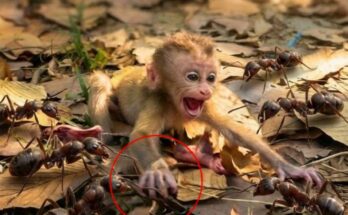
The Nyani, as these monkeys are called in the local language, are agile and clever. They leap between branches with incredible speed, forage for fruits, seeds, and insects, and communicate with a variety of calls and gestures. Yet, no matter how alert they are, danger is always lurking.
One fateful morning, the troop of Nyani in Yakukayali was foraging near the edge of the forest. The air was still, but hidden among the shadows, a predator was watching. Its golden eyes followed every movement, patiently waiting for the perfect moment. For young and inexperienced monkeys, this was the most dangerous time of day.
Suddenly, the forest erupted with the cry of alarm calls—short, sharp barks that signaled a threat. A leopard, silent until now, burst from the undergrowth with explosive speed. The troop scattered in all directions, leaping for the safety of the higher canopy.
But not all were fast enough. A juvenile monkey, distracted by feeding, was caught off guard. Before it could react, the leopard’s powerful jaws closed around it. The forest fell silent except for the sound of leaves rustling from the panicked escape of the others. The predator carried its prize away, disappearing into the thick foliage.
Predation is a harsh reality for the Nyani. Leopards are their most dangerous enemies, capable of climbing trees and launching ambushes from above or below. Eagles also pose a threat, especially to infants. Even large snakes like pythons lie in wait, ready to strike when a monkey ventures too close to the forest floor.
For the Yakukayali troop, losing a member is more than just a reduction in numbers—it is a loss felt deeply by the social group. Monkeys form close bonds, especially between mothers and their young. After an attack, the troop often becomes unusually quiet. Mothers clutch their infants tighter, older juveniles stick close to dominant males, and everyone remains more vigilant.
The danger from predators is part of an ancient balance. While it brings grief to the troop, it also keeps the ecosystem healthy. Predators control the numbers of prey species, preventing overpopulation and maintaining the natural order.
Still, witnessing such moments can be heartbreaking. For the people living near Yakukayali, the Nyani are familiar neighbors. They are seen in the trees along the river, playing, grooming, and calling to one another. Seeing one fall victim to a predator is a sobering reminder of how fragile life in the wild truly is.
In the end, the story of the Yakukayali monkeys is one of resilience. Each day they survive is a victory against hunger, disease, and predators. The young learn from the close calls, the adults adapt their strategies, and the troop moves forward together. But in the heart of the wild, there are no guarantees—only the constant test of survival.


